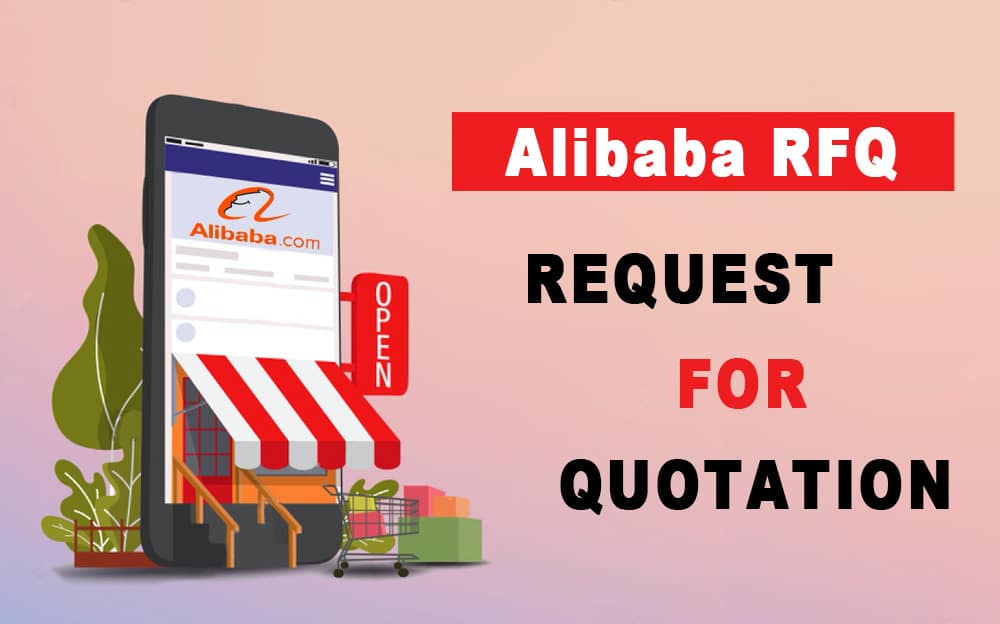
Alibaba is the world’s most extensive directory of factories and suppliers. It has a fantastic array of tools and services that can take your international trade to the next level.
Among them, the Alibaba RFQ tool helps to improve buyers’ sourcing efficiency, allows suppliers to connect directly with more qualified buyers, and capture more business opportunities.
In this blog, we’ll learn more about what RFQ is, what it means at Alibaba, how it works, what the advantages are, and much more.
So, in the following sections, we will provide a complete guide for Alibaba RFQ.
What Is Alibaba RFQ?

Alibaba RFQ, or Alibaba Request for Quotation, is when a buyer takes the initiative to fill out a purchase message, which details the specific requirements or features of a product they are interested in and entrusts the Alibaba platform to find a suitable seller.
While the supplier reviews the purchase request based on the buyer’s requirements and provides a price breakdown associated with each request.
In this large open marketplace, buyers proactively announce their sourcing requirements, and suppliers have the autonomy to select the right buyers to quote from.
Therefore, when buyers request a quotation, they can submit an RFQ, and Alibaba’s industry experts will review it and then post it to the RFQ marketplace and match it with the right supplier.
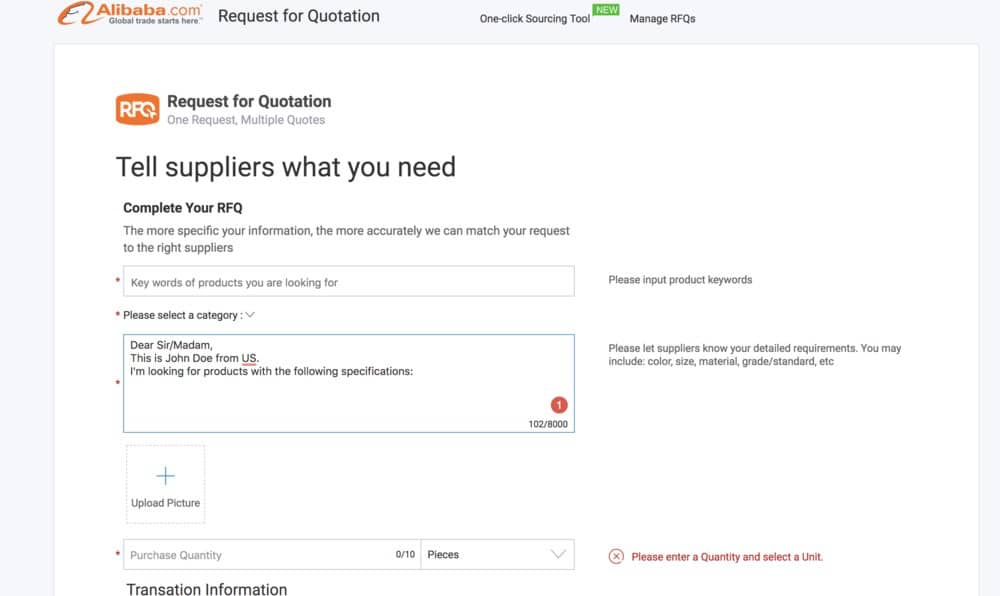
Conversely, suppliers can search and find relevant RFQ based on product name or category. If your RFQ arouses the interest of suppliers, they will quote for you through the RFQ platform.
You can then review, compare and manage all offers. RFQ is a handy tool that helps buyers know exactly how much each part costs.
With price comparisons, you can quickly see which suppliers will help you stay within your budget and where pricing may be too tight for your financial situation.
It also encourages price transparency, so you know what you’re paying. On the other hand, Alibaba RFQ service can help suppliers convert orders better and win more qualified buyers.
How Does Alibaba RFQ Work?
Posting an RFQ from the client is very easy. All you need to do is join your Alibaba account, fill out the RFQ registration form, and press “Submit RFQ”.
When the RFQ is submitted, Alibaba’s experts will review it before posting or releasing it to the marketplace. Then, it will be matched to an ideal supplier.
Suppliers can search keywords on the RFQ page to find your sourcing requirements, or Alibaba will push your requirements to suppliers with appropriate supply capabilities based on the product keywords you fill in.
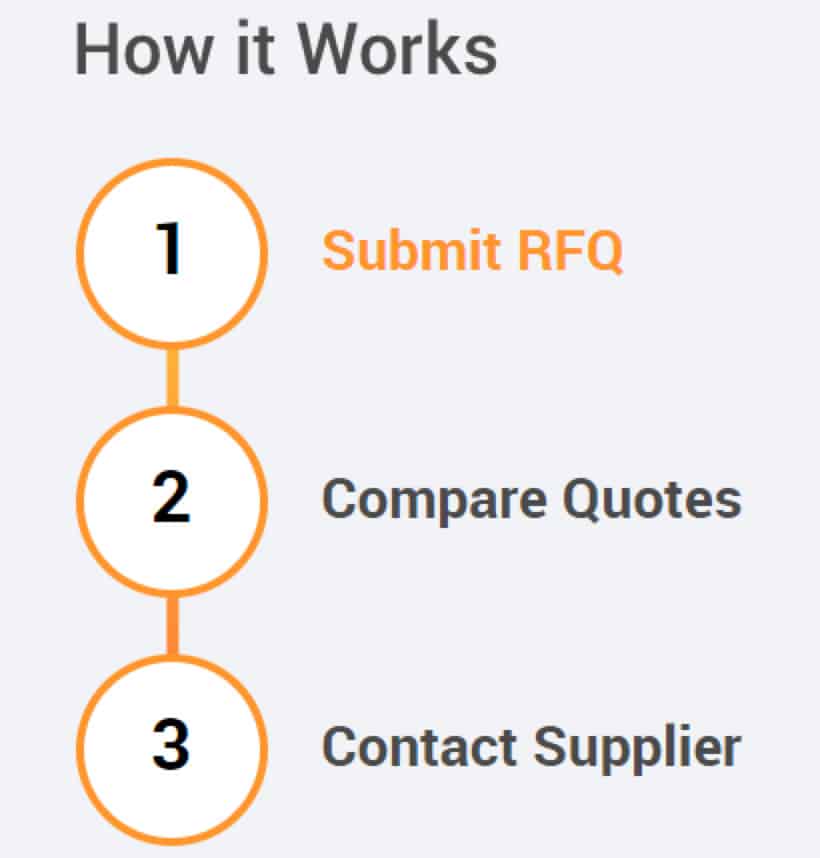
If the supplier is interested in your RFQ, they will give you a quote via RFQ, and you can also start communication with the supplier on Alibaba. You will also evaluate, compare and choose the final supplier.
So, the general work-flow of Alibaba RFQ is:
- Buyers post their request
- Alibaba’s experts perform Audit
- Supplier quote to buyers
- Buyers compare quotes
- Buyers contact supplier
- Deal done
Why Do You Need Alibaba RFQ?
When you browse on Alibaba, do you find that there are so many suppliers that you don’t know which one to choose? And using the Alibaba RFQ function allows you to find the best supplier on Alibaba.
When you do a supplier search and apply the verified supplier and trade assurance filters, Alibaba has filtered out the suitable suppliers for you. You will see page after page of supplier lists.
However, you must try to find the best supplier that matches your business, and Alibaba RFQ is a great tool to help you do that.
What is Alibaba RFQ Sourcing Tool?
First, we already know Alibaba RFQ sourcing tool means asking for a quotation. It is a free Alibaba service. Simply speaking, RFQ is your purchase request.
You can also understand that it will be open to all potential suppliers for bidding, enabling you to receive quotations from multiple suppliers within a few days.
Alibaba RFQ function changes how you used to spend hours contacting suppliers one by one, and sometimes, they don’t even reply to you. The RFQ function becomes a way to let suppliers come to you.
So if you use it correctly, Alibaba RFQ can be a powerful sourcing tool that allows you to find the best match for your suppliers.
Alibaba RFQ can help you:
- Get faster supplier response. RFQ attracts suppliers to you and forms 10-15 quotations in minutes.
- Compare costs more quickly. You can check and compare all quotations and evaluate them on one page.
- Proactive supplier service. Suppliers follow up and try to build a good relationship with you.
What Are the Advantages of Alibaba RFQ?
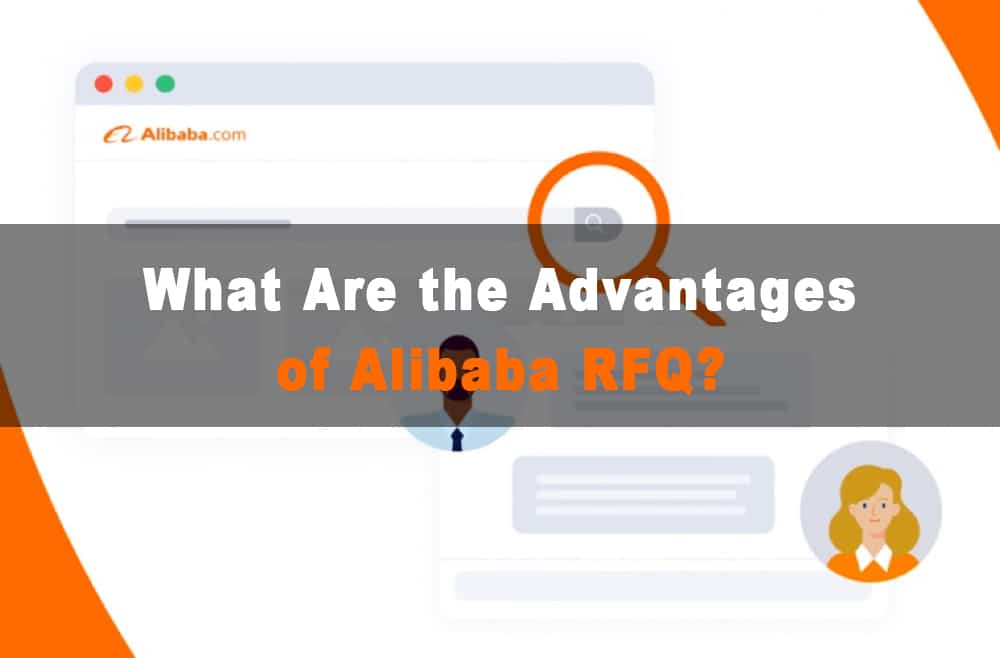
If you are looking for a product, whether it is a custom product or you want to find the same product that your competitors are selling, Alibaba RFQ is an excellent option for you.
Here are the most excellent advantages of using Alibaba RFQ services:
1. Faster supplier response
If you submit a purchase request through RFQ, once Alibaba’s industry experts approve, it will be posted to the Alibaba RFQ marketplace.
The key to finding the best suppliers using the RFQ service is to stand out from the millions of RFQs and attract quality suppliers.
While if you search for suppliers directly on Alibaba, you may need to spend hours or days developing a long list of suppliers to query one by one, and some suppliers may not respond.
In contrast, a high-quality Alibaba RFQ can attract suppliers to you and generate ten quotations in minutes.
2. Easier price comparison
In the Alibaba RFQ mechanism, there is no initial supplier screening because you only know which type of suppliers provide quotes when you receive the quotation.
You will find some quotations from intermediaries and some from manufacturers. If unsatisfied, you can initiate a new round of RFQ until you find someone you are willing to do business with.
Generally speaking, if you ask 20 suppliers directly on Alibaba, you may receive more than 20 emails from suppliers that need to be checked.
However, on the Alibaba RFQ platform, you can quickly review and compare all quotations by viewing them on one page.
3. More proactive supplier services
You can quickly get in touch with multiple suppliers through Alibaba RFQ service and then choose 2-3 good ones for further evaluation.
Usually, suppliers from RFQ services will proactively compete for your orders. They will also follow up closely after the offer to build a good relationship with you.
4. Faster to find the right supplier
If you are looking for a new product with some unique functions and are not even sure what keywords to use to describe it, you will have a hard time using keywords and product search to find the right product you are looking for.
In this case, submitting an Aliabab RFQ can save you a lot of time and help you find the right supplier more efficiently.
And also, if you want to find the same products that your competitors are selling, then an Alibaba RFQ is also a good option.
This is because you can list all the specifications and let suppliers with the same design contact you.
In short, Alibaba RFQ is a competitive approach that can benefit the buyer because the buyer can choose the supplier that offers the best price and product quality.
It saves time because the buyer does not need to find and contact suppliers alone. Instead, the supplier reaches the buyer and provides all the necessary details in the form of a quote.
What Are the Different Types of Alibaba RFQ?

Many buyers have recently purchased from suppliers using the Alibaba RFQ.
When buyers are looking for something specific or quantifiable, Alibab RFQ is very useful because it requires suppliers to itemize the cost of each phase of the product or item.
When a buyer is trying to get the best price for a standardized product, Alibaba RFQ can be your best friend.
Alibaba suppliers usually know they are competing for a specific product and will provide competitive bids that save you money. The best bids also offer competitive payment terms that can give you flexibility.
Alibaba RFQ helps you reduce costs by managing the bidding process. The following are the most common types of RFQ:
Open bidding
This type of RFQ is open to all potential suppliers, and the buyer can introduce some competition into the RFQ process through open bidding.
The bidding process is opened so that the offers may be revealed to other suppliers bidding on the project.
The obvious advantage is that it helps lower prices but can also lead to price gouging or collusion among suppliers. On the other hand, it may backfire and lead to suppliers fixing a flat price.
Closed bidding
Here, the time for suppliers to submit their quotes is specified, and the suppliers are not aware of the quotes offered by others until the bid opens.
This type of RFQ can help combat fraud in the bidding process and provide additional transparency. However, this process loses the competition that open bidding encourages.
Invitation to Bid
This is an RFQ used in a general sense. Here, specific suppliers are usually those you have worked with and asked to bid on the product. You can use this process for open or closed bidding.
One advantage of this type of RFQ is that you can quickly request quotes from suppliers you already know and trust, thus speeding up your procurement process.
However, this limits the opportunity to discover the cost savings that new suppliers may offer.
Reverse Auction
This type of RFQ works the same way as the auction process but in the opposite direction. In a typical auction, the seller wants the highest price for the product, while this RFQ is a reverse auction.
The buyer invites suppliers to submit their lowest bid for the specified product with the intent that the cost will continue to decrease as each supplier offers a new bid.
If you didn’t get the price through the first round of RFQ, you could ask the selected supplier to provide the lowest price for your desired product.
However, you should remember that once the lowest price is offered, the process is usually over, which means that other important factors may not be considered.
How to Create a Success Alibaba RFQ?

When you sign up for Alibaba as a free user, you are eligible to receive 10 RFQ quotes that you can use on selected suppliers.
You can also subscribe to the paid Alibaba RFQ service, which will give you access to additional quotes and resources, including a personalized profile page.
You can follow the steps below to set up a successful Alibaba RFQ:
Step 1: Go to the Alibaba RFQ homepage
First, please visit this page https://rfq.alibaba.com/.
Step 2: Complete the RFQ form
Here are some tips to make your RFQ more attractive to suppliers:
1. Specify your product name or category, specifications, and quantity
A short product category or name will simplify the supplier’s orientation to your RFQ. Also, Alibaba suppliers always have a MOQ requirement, so good suppliers will be less motivated to send quotes if the quantity is too small.
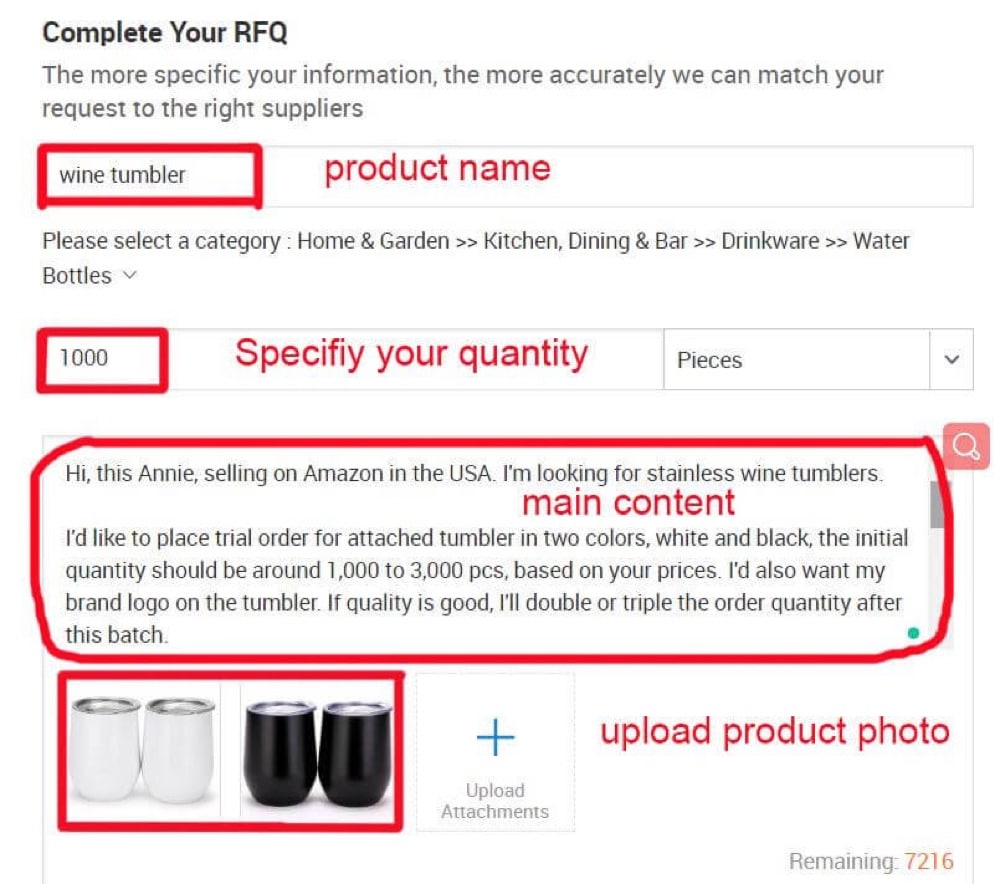
2. Upload photos of your products
This will make it easier for suppliers to see if they have the product in those photos. Or if they need to create the exact product you need.
3. Provide details and main content
This is the most important part that will allow the supplier to analyze your buying needs and rate this RFQ as a priority or not. So, be sure to give the supplier important details.
Step 3: Submit the RFQ
As mentioned earlier, there are free and paid RFQ services, and you can choose a type to best fit your current buying needs. After that, press “Submit RFQ” to post your form.

Step 4: View the quotation in the Message Center
You can find all supplier contacts and quotations in the “Message Center” and start reviewing them individually.
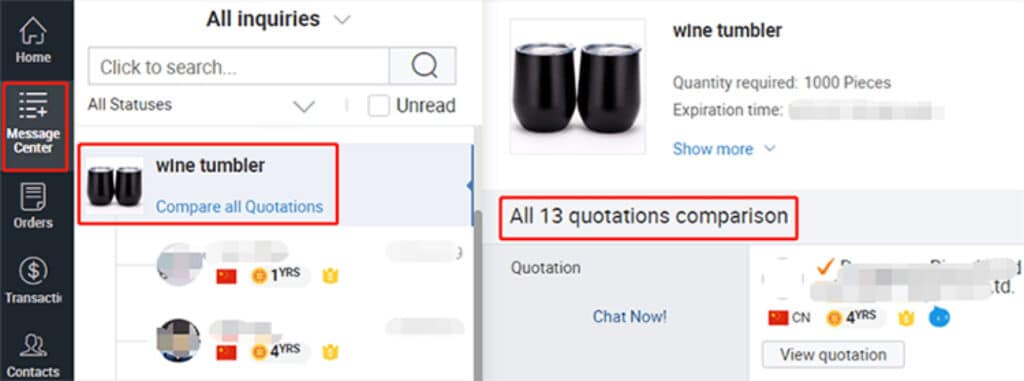
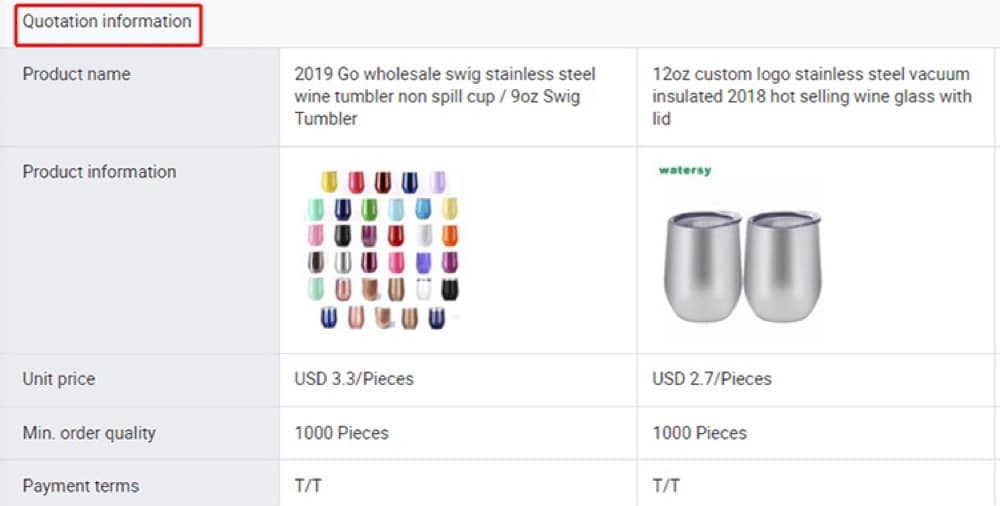
Step 5: Select and contact the supplier
After reviewing multiple supplier profiles and quotes, you can select 2-3 to communicate with them. If none of their prices are acceptable, you can start another round of RFQ or send RFQ directly to Alibaba suppliers.
Step 6: Ask for samples
Negotiate with them and ask them to provide samples to check the quality.
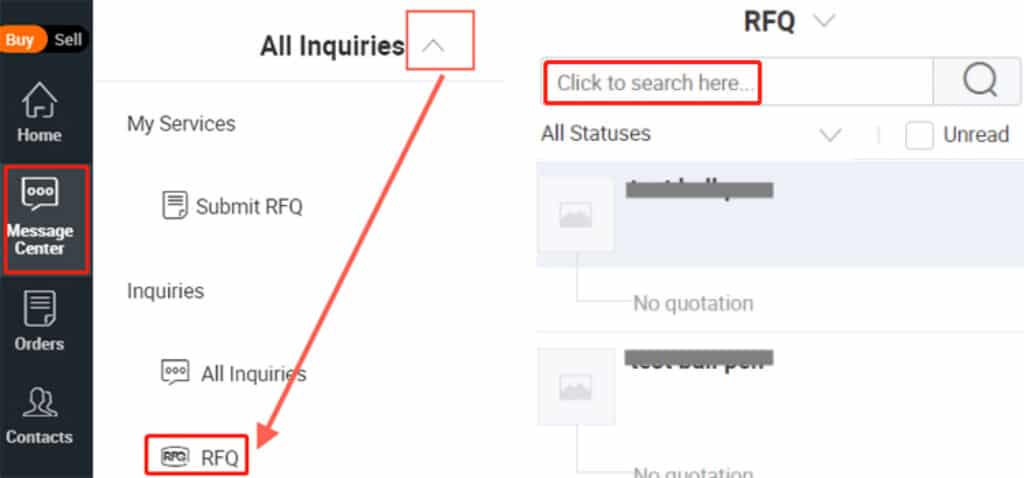
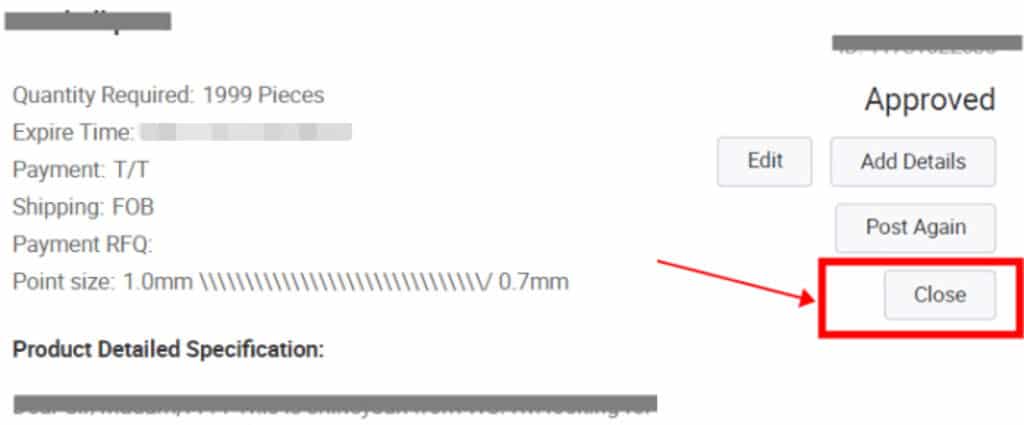
Step 7: Place an order
When you find the best supplier that meets your needs, go to that supplier and place an order.
What Should Be Included in an Alibaba RFQ?
The quotation you receive from Alibaba RFQ may be useless if you do not include important specifications such as materials, dimensions, and other technical details.
You should also clarify whether the supplier must provide a quote based on your custom design (OEM) or private label product.
If done well, an RFQ can help you compare costs on a one-to-one basis. A good Alibaba RFQ document should include the following:
1. General information
Provide information about your company and an overview of the services or products you wish to purchase. Be as detailed as possible about your requirements.
2. Quality and quantity requirements
If you are ready to submit an RFQ, you have probably already completed the research.
See which companies can meet your expectations, and include how many products you need. Also, you should add the quality or grade of each product you wish to price.
3. Pricing details
When creating a productive RFQ, the more details the better. Ask suppliers to break down labor prices, raw material costs, and delivery costs. Also, remember to ask them to explain additional costs.
4. Project time-line
If you are purchasing a service, specify the length of the contract and include specific dates. Also, if you want to procure goods, state in advance when you want the supplier to fulfill the order.
5. Delivery details
When sending an RFQ, double and triple-check to ensure everything is covered and clear.
Ask the supplier to give you a detailed price breakdown, as well as specific details they should identify for delivery, and review the exact dimensions of the product.
Find the Best Suppliers of Alibaba RFQ Template
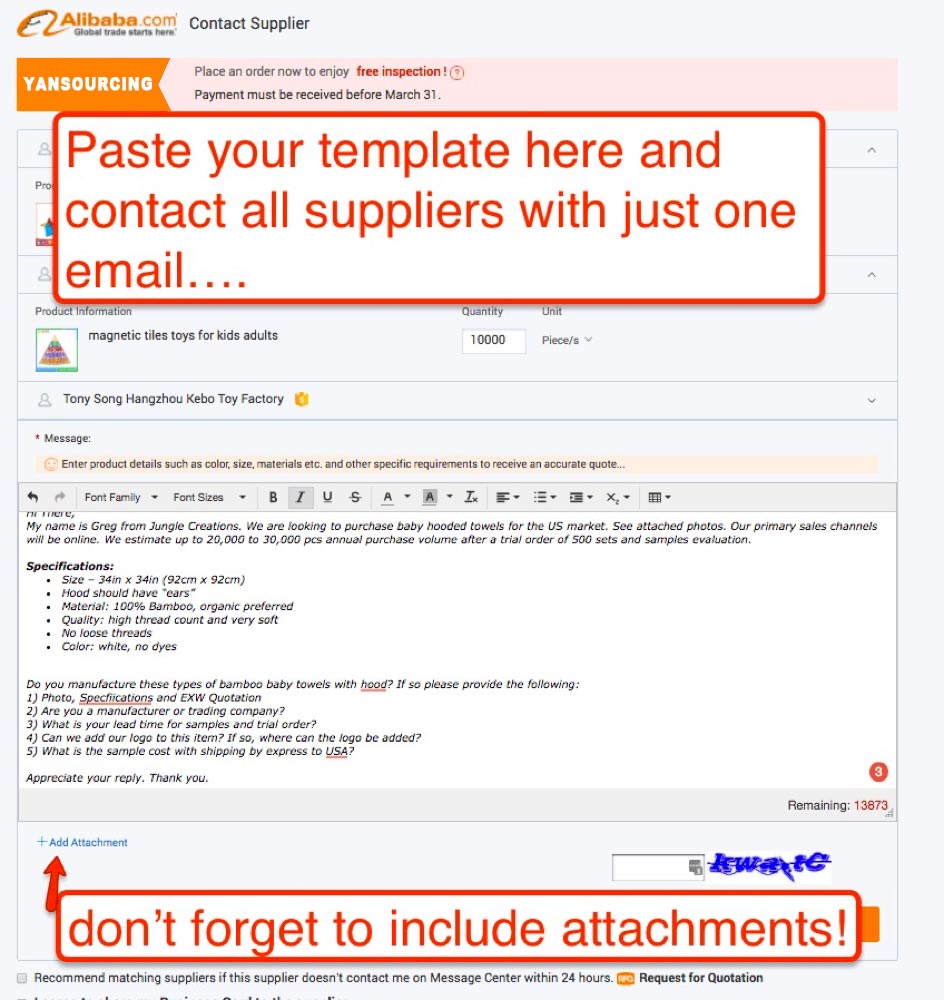
The following is an example of Alibaba RFQ template that will allow you to find the best suppliers:
Subject(s): “I’m interested in [product name]” or “RFQ for [product name]”
Hello [potential supplier] (note: if you have their name, please use their name),
I am [your name], the purchasing manager for [company name], and I am interested in receiving an offer for [product name]
[Write a few short sentences about your product]
[In a new block, create a bulleted list with materials, colors, and other basic attributes]
If you produce [product name], send more information to [your email]
In your response, please include these below:
- A picture of the product and a photo of [product details] (note: the details can be anything, make sure to ask them to use a photo taken for you, not one found elsewhere)
- Minimum order quantity and [other quantity] price (note: I find that getting two prices for different quantities can give you an idea of how flexible they are on price and helps with negotiations later)
- The price [for making any modifications or customizations] (be specific in this section, but if you want a product as is, you can skip it)
- What is the shipping cost to send the sample?
- The nearest port (note that if you are dealing with a factory, the port should be close to where they claim to be; if it is too far, be careful)
Thank you, we look forward to hearing from you!
[Your name]
Purchasing Manager
[Company Name]
Alibaba RFQ Frequently Asked Questions
1. Is it free to use Alibaba RFQ?
Yes, Alibaba RFQ service is perfectly free. But free RFQ function is limited, such as the number of suppliers that respond to your RFQ.
There is also a paid RFQ, which allows you to get more quotes from suppliers more quickly. It depends on whether you choose free RFQ or paid RFQ.
2. Do all suppliers respond to Alibaba RFQ?
No, it depends on whether the supplier quotes through Alibaba’s RFQ service, but most suppliers do not do it.
So, you must use Alibaba RFQ as an additional sourcing strategy, but don’t use it as your only way to find suppliers and accept quotes.
3. Is it possible to change the price after submitting an Alibaba RFQ?
Suppliers can still change their initial offer after submitting an Alibaba RFQ. The price can go up or down, depending on the market price of the material, manufacturing cost, etc.
Usually, the quoted price will only hold its value for a month or two. After that, prices may change due to fluctuations in market prices.
4. How to close an Alibaba RFQ?
If you don’t want to receive quotes about your bid anymore, you can close your RFQ. Here are the steps to close Alibaba RFQ:
- You can go to “My Alibaba” and log in to “Message Center”.
- From the drop-down menu, select the RFQ option. Select the RFQ you intend to close and press the “Close” button.
If the RFQ has expired, you will not see any “Close” options. Remember, you cannot delete your RFQ; you only can close it.
5. What is the difference between RFP and RFQ?
RFQ is a request for quotation, while RFP is a request for proposal. RFP is used when a project or its objectives are complex and involve many factors besides price.
Alibaba RFQ Conclusion
Using Alibaba RFQ service, buyers can increase their purchasing efficiency without exceeding their budget. By contacting multiple suppliers, buyers can get an idea of market prices and thus choose the supplier offering the best price.
We hope you have found this guide helpful and informative. Don’t forget to leave your comments below for further questions and suggestions.
I am Yan, the founder of Yansourcing, the best sourcing agent in China, who can quickly and safely help you buy and import from China. If you have any questions about importing from China, don’t hesitate to contact us.
